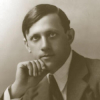Leo Ornstein

Leo Ornstein
Leo Ornstein was an American composer and pianist of the early twentieth century. His performances of works by avant-garde composers and his own innovative and even shocking pieces made him a cause célèbre on both sides of the Atlantic...
NationalityAmerican
ProfessionComposer
Date of Birth2 December 1893
CountryUnited States of America